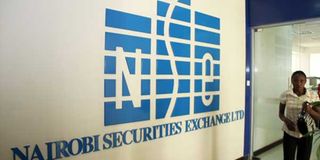Stockbrokers approve NSE share sale in June

The planned sale of the Nairobi Securities Exchange to the public inched closer to reality when the shareholders gave it the greenlight last Friday. PHOTO/DIANA NGILA/FILE
What you need to know:
- As part of a plan to entrench itself in market deals, the NSE has also applied for a licence to be allowed to run the futures or derivatives exchange, whose setting up is now entrenched in law. However, the timelines are yet to be issued.
The planned sale of the Nairobi Securities Exchange to the public inched closer to reality when the shareholders gave it the greenlight last Friday.
The members holding their annual general meeting approved the planned initial public offering that will see wananchi own part of the bourse.
“The NSE IPO will enable a wide section of Kenyans to both own a piece of the exchange and to share in the future financial success of this company which has a very rich national heritage,” said NSE’s chairman, Mr Eddy Njoroge.
The company also announced the appointment of the transaction advisers to spearhead the process.
The date of the listing has now been set for June.
Demutualisation, which has been on the NSE’s plans for nearly 10 years now, will see the management of the bourse separated from the ownership, thereby paving the way for the sale of the exchange to the public through an IPO.
This is expected to lead to enhanced transparency and accountability in the management of the exchange, which conducts multi-billion shilling deals for both local and foreign investors.
“We expect formal approval to be granted by the regulator shortly. This will open the door for the long-anticipated self-listing,” Mr Njoroge told the shareholders.
The Capital Markets Authority is looking at the final application from the NSE for authorisation to be allowed to go ahead with the listing plans as scheduled.
“The NSE’s impending demutualisation will provide further impetus for the exchange to support the attainment of Vision 2030, further positioning our capital markets as the hub for East and Central Africa,” Mr Njoroge noted.
Should the planned self-listing go as anticipated, the NSE will self-list on the Main Investment Market Segment (MIMS) before the end of June.
As part of a plan to entrench itself in market deals, the NSE has also applied for a licence to be allowed to run the futures or derivatives exchange, whose setting up is now entrenched in law. However, the timelines are yet to be issued.
This followed a protracted tussle between the exchange and the capital markets regulator on the minimum capital required for running the derivatives or futures market.
The authority had proposed a minimum of Sh1 billion, which the NSE contested, saying this was meant to lock it out of the race to run the derivatives business. In turn, it suggested that it be given ample time to meet the requirements.
The derivatives market is expected to be established this year. It is set to provide affordable and convenient means to individuals and companies for investing and for cushioning them against interest rate fluctuations and exchange rate and commodity price volatility.
The market is also expected to boost liquidity levels in the underlying assets, which is a definite attraction to investors.
In the 2013 financial year, the exchange reported a 209 per cent rise in net profit to Sh263 million from Sh85 million in 2012.
Its income stood at Sh622.7 million.




